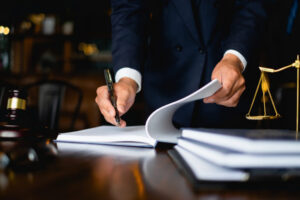
Causation is key in personal injury claims, especially for accident injuries. It establishes a direct link between the defendant’s actions and your injuries.
Below, you can read about causation and its role in your personal injury claim.
What Is Causation in Personal Injury Claims

Causation is the legal principle that connects a defendant’s negligence to a plaintiff’s injuries. In Florida, causation is a legal element of personal injury and wrongful death claims. It is a two-part test that establishes whether a defendant’s actions caused an injury. The two parts of the test are causation, in fact, and foreseeability.
Causation In Fact
Also known as but-for causation, the injury would not have occurred without the defendant’s actions.
For example, if a driver runs a stop sign and hits a pedestrian, we can say that “but for” the driver’s actions, the pedestrian would not have been injured.
Foreseeability
This test assesses whether the harm was a predictable outcome of the defendant’s actions.
A court will not hold a defendant responsible for every foreseeable harm their actions cause, only the foreseeable ones.
To win a personal injury claim, a plaintiff must prove both causation in fact and foreseeability.
How Causation Affects Your Personal Injury Case
Causation is crucial in proving liability. Without it, you cannot recover damages, even if the defendant acted negligently. You must show that their actions set off a chain of events that led to your injuries.
In a slip and fall case, you must show that a property owner failed to fix a hazard, like a wet floor. Their failure must have caused your fall and injuries. If another factor, such as a medical condition, played a greater role, the defendant may argue that their negligence was not the primary cause.
Common Issues With Causation in Personal Injury Cases
Several challenges can complicate causation in a personal injury claim:
- Multiple Causes: If many parties or conditions caused an accident, it can be hard to find the main cause.
- Pre-Existing Conditions: If the victim had a prior health issue, it can be hard to show that the accident made the injury worse. It’s tricky to prove that the accident, not the condition, caused harm.
- Third-Party Involvement: If another party’s actions help cause the injury, it may affect liability and damages.
Overcoming these challenges often requires expert testimony and substantial evidence.
Why Is Causation Important in Florida Personal Injury Law?
Florida law requires plaintiffs to prove causation to hold a defendant liable for an injury. Causation must be proven to determine liability and damages. It is also necessary to get fair compensation. Your claim may be denied if you cannot prove that the defendant’s negligence caused your injuries.
Also, Florida has a modified comparative fault rule. If you are partly to blame for the accident, your compensation may be reduced. For example, if you are found to be 20% at fault, your total compensation will be reduced by 20%. However, you will not be able to recover damages if you are more than 50% at fault.
How Causation Affects the Value of Your Personal Injury Case
The ability to prove causation directly impacts how much compensation you can receive. If you can clearly demonstrate that the defendant’s negligence caused your injuries, you may be entitled to recover damages for:
- Medical Expenses: includes hospital bills, rehabilitation costs, and ongoing treatment
- Lost Wages: compensation for time missed from work due to injury-related limitations
- Pain and Suffering: covers the emotional and physical distress caused by the injury
- Property Damage: if personal property, such as a vehicle, was damaged in the accident
The stronger the evidence linking your injuries to the accident, the higher the potential compensation.
Understanding Causation in Your Injury Claim
Causation plays a central role in every personal injury case. Without proving a direct connection between the defendant’s actions and your injuries, your claim may not succeed. If you have been injured due to someone else’s negligence, consulting an experienced Florida personal injury lawyer can help you navigate the legal process and secure the compensation you deserve. Contact our law firm at Norden Leacox Accident & Injury Law. Call us at (407) 801-3000.
